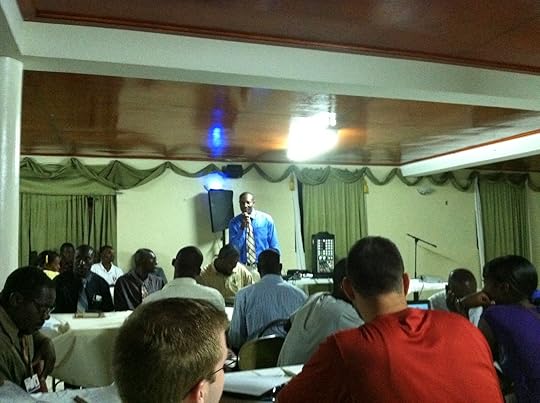Erik Reed's Blog, page 2
March 25, 2014
Why TJC is Partnering with The Haiti Collective
 The Journey Church recently finished a six month process of praying and fact gathering to discern where the Lord would have our church invest in global missions. It is our mission as a church to be a gospel-centered church that makes knowledgeable, obedient, and passionate followers of Jesus Christ. We focus our effort to this by 1. celebrating the gospel in WORSHIP each week, 2. applying the gospel in COMMUNITY with each other, and 3. extending the gospel through MISSION both locally and globally. That is our focus as a church. So we have been prayerfully seeking God's direction for how to fulfill the global part of this third component of our mission.
The Journey Church recently finished a six month process of praying and fact gathering to discern where the Lord would have our church invest in global missions. It is our mission as a church to be a gospel-centered church that makes knowledgeable, obedient, and passionate followers of Jesus Christ. We focus our effort to this by 1. celebrating the gospel in WORSHIP each week, 2. applying the gospel in COMMUNITY with each other, and 3. extending the gospel through MISSION both locally and globally. That is our focus as a church. So we have been prayerfully seeking God's direction for how to fulfill the global part of this third component of our mission.In the beginning we believed we were going to adopt an unreached unengaged people group in Europe. We did a lot of research on this. We made a trip to the International Mission Board's conference for European missions. We made contact with missionaries all over Europe. And we prayed for God's direction. At the end of all our exploration, we did not believe the timing was right for TJC to go to Europe. Our church body was not quite ready financially, or with personnel, to have maximum effectiveness in Europe. We still believe there will be a day when we engage in European missions, we just do not sense it is time.
Why Haiti?
After we looked thoroughly at Europe, we began to set our eyes on a more accessible location for us to invest. We thought about Mexico, Jamaica, Cuba, and Haiti. There were pros and cons to each, but we began to pray about where we could be effective and engage the largest number of people in our congregation in missions. This led us to Haiti, and in particular, The Haiti Collective (hereafter THC).

 (above: the beautiful landscapes of Haiti, below: the stark reality of poverty)
(above: the beautiful landscapes of Haiti, below: the stark reality of poverty)I had been on three previous trips with THC and have seen the amazing work of ministry happening in Haiti. THC focuses on bringing hope to Haiti through the love of Jesus Christ. It is committed to the local church and investing in its leaders and ministries. More specifically, THC seeks partnerships between US churches and Haitian churches. In this partnership, there is pastoral training, orphan care, micro-business, church planting, medical care, adoption, and many other amazing opportunities to serve the Kingdom of God.
Though this is not global missions to the unreached unengaged, that does not mean this is not a desperately needed and fruitful mission. There are millions of lost people in Haiti and there is a spiritual darkness that exists there because of the presence of Voodoo. In addition to millions of lost people, Haitian churches are filled with believers that do not have the resources afforded to us for discipleship and spiritual growth. The pastors are not theologically educated and can rarely afford the resources to acquire that education. By empowering these local churches and pastors, we are equipping them to reach Haiti with the gospel.

 (above: orphans eating, below: an orphan gets her meal)
(above: orphans eating, below: an orphan gets her meal)Our church has committed to approach local and global missions from a long-term perspective. We do not want to take short-term trips to different places each year. We want to invest in a partnership and relationship that is enduring and lasting. We want to build relationships with those we minister to and with. We want to grow with the leaders and support the orphans. We desire that TJC folks would adopt many of these orphans. THC gives us that opportunity.
Where Are We Investing?
 (Port-de-Paix is in northern Haiti)
(Port-de-Paix is in northern Haiti)The Journey Church will be partnering with a church in the city of Port-de-Paix. It has a population of roughly 250,000 people. It is located in the northern part of Haiti on the coast. The church in Port-de-Paix is led by two pastors who work bi-vocationally to lead the church. The church is caring for orphans and providing education, clothing, and food for them. There are so many opportunities for us to partner with this church to extend the gospel.

 (above: clean water filters provided by THC, below: pastor's conference & training) When Are We Going?
(above: clean water filters provided by THC, below: pastor's conference & training) When Are We Going?We will be taking a team to Port-De-Paix this summer (2014) on August 8th-16th. We will begin promoting this at church soon and enlisting those interested. We are looking to take a team of 4-6 folks. We will be doing theological training with the pastors, evangelistic services, VBS with the orphan children, with the potential of doing some medical missions if we have the right personnel. The cost of the trip will be roughly $2,000 per person. This pays for airfare, ground transportation, food, water, and lodging. Every needed expense on the trip will be covered by this cost. We will look to do some fundraisers to lower this overall cost for those attending.

 (above: Haitian children, below: Sunday worship gathering)
(above: Haitian children, below: Sunday worship gathering)Those interested will need to:
1. sign up and indicate your interest level
2. acquire your passport
3. attend all required meetings about the trip (first mtg April 18th)
4. $100 deposit due before May 8th
We will share more details at our first meeting about the trip. If this is something you would like to participate in, mark your calendars now, and begin to make preparations to be a part of this incredible ministry.
If you cannot go on this first trip in August, we are looking to take another trip in January. We can take multiple trips per year, so be sure to prayerfully seek the Lord about how you may participate in this incredible opportunity to extend the gospel globally through MISSION.
Every person is responsible for participating in global missions. There are only three possible options: you're a sender, you're a goer, or you're disobedient. Which will you be?
share this post so others can know what's happening in global missions
Published on March 25, 2014 07:21
March 24, 2014
John Owen on the Grace of Christ
 "The endless, bottomless, boundless grace and compassion that is in him who is thus our husband, as he is the God of Zion."
"The endless, bottomless, boundless grace and compassion that is in him who is thus our husband, as he is the God of Zion.""...if all the world should (if I may say so) set themselves to drink free grace, mercy, and pardon, drawing water continually from the wells of salvation; if they should set themselves to draw from one single promise, an angel standing by and crying, "Drink, O my friends, yea, drink abundantly, take so much grace and pardon as shall be abundantly sufficient for the wolrd of sin which is in every one of you;" - they would not be able to sink the grace of the promise one hair's breadth. There is enough for millions of worlds, if they were; because it flows into it from an infinite, bottomless fountain."
"This infiniteness of grace, in respect of its spring and fountain, will answer all objections that might hinder our souls from drawing nigh to communion with him, and from a free embracing of him. Will not this suit us in all our distresses? What is our finite guilt before it? Show me the sinner that can spread iniquities to the dimensions of this grace. Here is mercy enough for the greatest, the oldest, the stubbornest transgressor."
Of Communion with God the Father, Son, and Holy Ghost. The Works of John Owen. The Banner of Truth Trust. Volume 2. Part II. Chapter 3. Digression 1. (p.61-62)
Published on March 24, 2014 06:58
March 5, 2014
The Alter Call and Why We Don't Do It at TJC
 The church I pastor (The Journey Church) is 8 years old. Over those years we have witnessed God save hundreds of people and we have had the privilege of baptizing hundreds more. However, during the course of these years we have not offered what is traditionally known as an "alter call" or "invitation." I do not go stand down front and wait for people to walk up to me for prayer or salvation why the band plays "Just As I Am" for the one millionth time. I think this is more for the ego of pastors and/or the assurance that things are "happening" for the congregation.
The church I pastor (The Journey Church) is 8 years old. Over those years we have witnessed God save hundreds of people and we have had the privilege of baptizing hundreds more. However, during the course of these years we have not offered what is traditionally known as an "alter call" or "invitation." I do not go stand down front and wait for people to walk up to me for prayer or salvation why the band plays "Just As I Am" for the one millionth time. I think this is more for the ego of pastors and/or the assurance that things are "happening" for the congregation."But don't you guys want people saved?" We absolutely do! And we have seen people saved, many people! Every week we preach the Bible, we offer Christ to sinners, and invite people to turn from their self-absorbed lives to a life submitted to Christ through faith and repentance. We just happen to believe this can happen in the seats as they hear the gospel, at home in their bedroom, in their car driving, or any number of other places. An alter call and invitation at the end of service, where 3 minutes is designated for salvation, is unrealistic. Some people have questions, need to work through issues, need to sit down and see things from the Bible, need counsel through difficult situations, and many other things. "Just As I Am" does not offer enough time to do this, nor is the time necessarily the most optimal or ideal.
In the Bible-belt, where we are located, many cannot conceive of any other way of salvation happening, apart from the alter call. But what I found in my time pastoring in the South is many stake their assurance of salvation on "walking the aisle" or "praying the prayer" or "raising my hand" or "praying with the pastor." None of these things mean anything apart from the work of the Holy Spirit to regenerate the heart of a dead sinner. Walking aisles and repeating prayers don't change hearts, in fact, they may actually deceive hearts. Talking to a pastor doesn't save you. There is only one Mediator between God and man, it is the Lord Jesus Christ, not your pastor. We are to flee to Jesus, not Pastor X.
"But aren't people supposed to make a public declaration of faith?" Yes. That is what baptism is. Trusting and surrendering to Christ can be a private thing, in fact, it must be personal and individual. However, baptism is our public declaration and profession of our commitment to the Lord Jesus Christ. An alter call is not necessary for people to make public professions of faith.
Pastor Ryan Kelly of Desert Springs Church shares a good summary of my thinking on this subject with 10 points against the alter call:
1. The altar call is simply and completely absent from the pages of the New Testament.Can God save somebody who "walks the aisle" or "prays the prayer?" Yes. Does God need these things to do so? No. The church for the first 1800+ years of its history never knew such a phenomena.
2. The altar call is historically absent until the 19th century, and its use at that time (via Charles Finney) was directly based upon bad theology and a man-centered, manipulative methodology (more about that here).
3. The altar call very easily confuses the physical act of “coming forward” with the spiritual act of “coming to Christ.” These two can happen simultaneously, but too often people believe that coming to Christ is going forward (and vice-versa).
4. The altar call can easily deceive people about the reality of their spiritual state and the biblical basis for assurance. The Bible never offers us assurance on the ground that we “went forward.”
5. The altar call partially replaces baptism as the means of public profession of faith.
6. The altar call can mislead us to think that salvation (or any official response to God’s Word) happens primarily on Sundays, only at the end of the service, and only “up front.”
7. The altar call can confuse people regarding “sacred” things and “sacred” places, as the name “altar call” suggests.
8. The altar call is not sensitive to our cautious and relational age where most people come to faith over a period of time and often with the interaction of a good friend.
9. The altar call is often seen as “the most important part of the service”, and this de-emphasizes the truly more important parts of corporate worship which God has prescribed (preaching, prayer, fellowship, singing).
10. God is glorified to powerfully bless the things He has prescribed (preaching, prayer, fellowship, singing), not the things we have invented. We should always be leery of adding to God’s prescriptions for His corporate worship.
At The Journey Church, we invite people weekly to trust Christ. And something amazing has happened over the last 8+ years - they have. What does it look like? It looks like conversations after our worship gatherings conclude. It looks like emails or Facebook messages to meet up and discuss what God is doing in their hearts. It looks like conversations in Gospel Communities or a Membership Meeting. There are many conversations about the gospel and responding to it taking place throughout the week at The Journey Church. We happen to believe the 3 minutes segment of time often known as the "invitation" is unnecessary, and perhaps unhelpful, in leading people know and understand how to follow Jesus.
if you believe this article was helpful, share with others
Published on March 05, 2014 07:52
February 27, 2014
Yes, Argue. But, Yes, Pray

The more I ponder the plight of our country the more I'm reminded that public square conversations are needed and defense of the Christian worldview from those who want to attack is necessary. There needs to be healthy arguments given in defense of the Christian position. However, I'm also reminded the only thing that will bring real and lasting change to our country is a revival of the gospel. For that we must pray.
In Colossians 1:3-6 Paul writes to the church there:
3 We always thank God, the Father of our Lord Jesus Christ, when we pray for you, 4 since we heard of your faith in Christ Jesus and of the love that you have for all the saints, 5 because of the hope laid up for you in heaven. Of this you have heard before in the word of the truth, the gospel, 6 which has come to you, as indeed in the whole world it is bearing fruit and increasing—as it also does among you, since the day you heard it and understood the grace of God in truth,
A few points of observation for us to consider here:
1 . Paul calls the gospel "the word of truth." The gospel is the truth about God, us, the world, and reality.
2. Paul states to the Colossian believers that the gospel is bearing fruit and increasing in the whole world. The gospel was going forth and bearing fruit. The influence of the gospel was spreading and growing.
Friends, the God who brought the growth and increase from gospel seed planting is the same God we serve today. He can revive us again. He is the Sovereign Lord of the universe and of the harvest. We must pray for revival to burst forth on our land. Until then, may we be faithful seed planting and soil watering believers, who live with a fervency of prayer for God to cause the word of truth to increase throughout the world.
share with others if you believe they can benefit from this article
Published on February 27, 2014 07:12
February 25, 2014
Conscience, Religious Liberty, and Discrimination

**Warning: Some graphic language and terms are used in order to communicate a point, the language and tone of these examples do not reflect my personal feelings or views or that of The Journey Church or other organizations I represent
A huge issue being discussed right now in the national media and within Christendom is religious liberty versus discrimination. The gay marriage debate is front and center, once again, and the subject now is over religious freedom to decline services to same-sex partners or whether it is discrimination.
I do not pretend that this is an easy issue. But it is an important one.
The debate centers around Christian conscience of assisting or performing services for a same-sex marriage. This is not about whether a burger joint owned by Christians should serve homosexuals at their counters. This is not about whether a gym owned by Christians should allow homosexuals to be members. This is about asking business owners or service providers to provide a service that directly violates their conscience.
For example: there have already been cases around the country of florists, bakers, and photographers being fined by the government for refusing to participate in same-sex marriage ceremonies due to their Christian convictions. The government is currently making decisions and legislation that would force these businesses to provide services and violate their conscience.
There has been much written about this as of late. Trevin Wax writes particularly about the violation of conscience here. Al Mohler writes here about the coercion of the government to force people to do things against their religious liberties. Doug Wilson writes here in response to two journalists who write and compare not serving homosexuals as Jim Crow laws. Joe Carter writes here about why the issue of homosexuality and gay marriage is not the same as race and civil rights. You can go and read these articles to gain more understanding of the issues at hand here.
The way I would like to end this post is to share why I'm personally concerned about our trajectory. Our government is rapidly falling in line with the narrative that to decline services to someone for religious convictions is insufficient and only a cover up for discrimination. This bothers me because I can see a day when someone contacts me about renting our church to have a same-sex marriage and/or asking me to perform the ceremony. We would decline both requests for such services. What happens when this is reported to civil authorities as discrimination and/or a hate crime or violation of civil rights, and the church, including myself, are fined, penalized, and even prosecuted?
I am not homophobic. I have friends who are professing homosexuals. I do not agree with this lifestyle based on my religious convictions and worldview. However, I will eat in the same restaruant with them. I will workout on the same machines and equipment. I will use the same pool. I will root for them when they make a tackle, hit a jumper, or throw a no-hitter. They are welcome to attend our church's worship gatherings. However, to ask me to endorse, support, or contribute to their being married, violates my conscience and convictions. But it appears we are on track for the government to say, "Too bad."
Consider some parallel situations and ask whether it is appropiate for services to be performed:
-- a lesbian couple who owns a sign shop are asked to create a banner for an anti-gay rally that says, "Fags go to hell!" Should they be forced to create this sign?
-- a black family who owns a bakery are given an order for a cake that reads, "Happy 150th Anniversary Ku Klux Klan: Death to all Nigers." Should this family be reasonably expected to make this cake without pause or hesitation or are they discriminating?
-- a Jewish family who owns a kosher restaurant is asked to supply an order of smoked ham. Are they forced to violate conscience because they are a public restaurant or are they discriminating against us pork lovers?
-- a feminist bookstore owner is asked to carry a book by a guy who constantly slams women, refers to them as "bitches," and writes insistently on how the only uses for a woman are sex and carrying babies. Should she be made to sell and promote such a book in her store or is she discriminating?
-- a pacifist movie theatre owner is asked to show a documentary supporting and propagating war called "The Beauty of War." Is he to violate his conscience or is he discriminating?
-- a Muslim family who owns a tee shirt print company is asked to produce shirts which read, "Jesus is Lord, Muhammad's a Liar." Is the family expected to go along with this or would it be discrimination to decline?
The purpose of some of these graphic scenarios is position us to see what is at stake here. In each one of these examples, I believe the business owners are within their rights to decline services. I do not believe any of them should be forced to violate their conscience and convictions, regardless of whether the pressure is from the public or the government.
We are not dealing with bigotry and discrimination. I do not know any thoughtful and devout Christians who are homophobic or consumed with making homosexuals miserable. The charge often leveled against Christians is we are consumed with this issue. I'm not consumed with this. I do not desire to spend significant time writing or speaking about it. However, when it is constantly pushed in your face by the media, the gay activists, and the government, then Christians have to speak up. We do not want to violate our conscience. It is not discrimination. It is not a race issue. It is not bigotry. It is about our convictions and the religious liberty to live those. If we do not have that, then our country is but a faint shadow of what we once were, and my own military service to uphold our freedoms seems in vain.
if you believe others can benefit from reading, share with it with them
Published on February 25, 2014 18:20
February 24, 2014
Chuck Liddell and Hope for Your Day

Philippians 3:20-21 But our citizenship is in heaven, and from it we await a Savior, the Lord Jesus Christ, who will transform our lowly body to be like his glorious body, by the power that enables him even to subject all things to himself.These words are powerful. They are God's words. They are penned by men, but inspired and directed by the Spirit of God. These words are meant to fuel hope, encouragement, and joy.
Our citizenship, as followers of Jesus Christ, is heaven. And from heaven we await our Savior. He's coming back. He is coming to restore all things. He is coming to redeem creation and establish his kingdom forever.
Then he will do something amazing. He will transform our lowly, sickly, dying bodies, into glorious, perfected bodies, like his own. We will be raised to new life and never sin again. Never die again. Never get sick again. This is the hope of the Christian life. We long for and await this day.
But what causes us to believe in this hope?
What makes us think this can actually happen?
The answer: because the power that enables Jesus to subject all things to himself is the power that cause these dead bones to live.
This verse packs a Chuck Liddell to the temple type ending. Jesus, who was raised from the dead, ascended to the right hand of God, now rules and reigns over the unviverse, and every molecule in it. He upholds the universe by the Word of his power (Hebrews 1:3). The same power that enables him to subject all things to himself is the very power that will one day cause these lowly bodies to be glorious.
Oh friends, the Christian hope is an incredible hope. Set your eyes on your citizenship in heaven today and the Savior we await to come from there. For in a blink of an eye he is coming. He leaves us in the closing words of our Bible's with the promise, "Surely I am coming soon."
share with others using the buttons below
Published on February 24, 2014 07:08
February 11, 2014
Does Daddy Really Love Me?
 This is the essential question behind our struggles with sin.
This is the essential question behind our struggles with sin. But I'll return to that issue in just a moment.
As a father of three children, two who are old enough to be into everything, I am often giving commands. "Don't jump off that. "Don't put that in your mouth." "Read some pages in your book before playing on the iPad." "Eat more of your dinner." "Take your medicine." And the list could go on.
All of these commands have one thing at their core: I love and care for my kids.
I love my kids. And my love for them is why I give them commands. I don't want them to get injured or sick. I want them to be able to read competently, not just play video games. I want them to grow strong and be healthy. All of the commands I give them are fueled by my love and affection for them. I want the best for them.
But you have kids. And you know that while my reasoning for the commands is the love I have for them, they only see it from a perspective of rules. Their young minds only perceive daddy as a rule-giver. However, these potential perspectives from my kids doesn't stop me from giving and upholding those rules. Why? Because I love them enough not to give them over to irresponsible, destructive behaviors. I'm not going to let them jump from things that will injure them or let them only eat Hershey Kisses or neglect homework for games. This is not me being the Big Ole Meany Butt, it is demonstrating Fatherly love and care for my beloved children.
Now back to my opening statement about "Does Daddy Really Love Me?" as the essential question behind our struggles with sin.
When we ask the question, we are not speaking of earthly fathers, but our Heavenly Father. Whether it is having sex outside the confines of God's decree of a marriage covenant between a man and a woman or our unhealthy clinging to material possessions, we have commands from God that we are expected to obey. Be it stealing, lying, drunkenness, gossip, or any number of sins, we have boundaries God has given for us to live in.
However, like young children with their parents, we do not like rules. We do not always understand the wisdom of why we cannot do something. We do not always grasp the benefits we will experience if we will submit to our Father's will. I believe the question we must remind ourselves to ask, which empowers obedience is, "Does daddy really love me?"
The answer to that question is an emphatic and unquestionable: yes! He loves you more than anyone else ever has. The Bible makes clear God's love for us, namely in sending His Son to atone for our sins (Romans 5:8; John 3:16; 1 John 4:10). God has affections for you and delights in you, which is why He does not want you to engage in actions, behaviors, and attitudes that are destructive to you. He wants you to thrive and live a life of joy.
The issue is many of us reason like children and believe the Hershey Kisses for dinner (or sex outside of heterosexual marriage) or neglecting homework for video games (or clinging to material possessions) are the most desirable things, but meany-butt daddy won't let us. The list could go on, but the issue remains the same. If we trust daddy is wise, then we can submit to his ways, because we believe he has our best interest at heart, and he loves us.
Daddy does love us. Rather than rallying together the siblings to reason with ourselves about how "out-of-touch" dad is or to overthrow him so our wisdom will prevail, we should submit to the loving commands of our Father. Even when we do not understand "why" He commands what He does, perhaps our advice to our children, heard from the lips of God, would be apropos, "Because I said so, and I love you."
if you think others could benefit from this article, share it by using the buttons below
Published on February 11, 2014 05:37
February 6, 2014
An open letter to my social media friends

There are many things I am still learning about life and maturity. So my open letter is not coming from the guy who has figured it all out. However, I want to issue a plea to all my fellow social media users. I believe we have allowed social media to distort how we deal with issues in our lives. Let me explain.
One of the drawbacks of social media is that it has dulled our sense of what should be shared publicly and what should not. We have become so accustomed to telling everyone about our lives that wisdom has walked out the door. We over share details of our lives that should be kept to ourselves or our family. There are such things as inappropriate status updates - and it has nothing to do with the amount of clothing you are wearing.
You know this to be true. How many times have you been on social media and read a status and thought to yourself, "TMI" or "over share"? How many times has your spouse or friend said to you, "did you see what _______ posted on Facebook today?" So we are all aware that this happens. But what we like to think is that it doesn't happen with us.
Instead of keeping certain things to ourselves or taking time to process issues with people in real life, we blast our thoughts for all the world to see. In doing this we think we are being authentic and real, you know, really sharing our lives with others. But instead what happens is we live under the illusion we are actually dealing with issues when in fact we are not. We actually start using social media to be passive aggressive and "make a statement" when what we should do is pick up a phone or go sit down with someone.
Airing out your marriage problems on Facebook is inappropriate. Talking about how bad someone hurt you or how disappointed you are in someone is not Facebook material. Why? Because these are things you should address with a much smaller group of people in real life, not the social media world. You may garner sympathy and a slew of encouragers, but what happens if you are the problem or reason for the dispute? What happens if you are in the wrong? People on Facebook don't know that...because they are not really in your life. They are in the life you portray. There's a big difference.
People I went to high-school with 15 years ago, that I do not see or interact with in daily life, do not need to know I'm angry at my wife or grieving some internal hurt. Why? Because they cannot do anything. Social media was not created for dealing with life issues. You can stay in touch with people through social media, but it is not supposed to be the place where our relationships take place. And because of that, it is not the place where we air our problems and hurts, at least not the real ones. Those are reserved for the people who are truly in our lives. These are the people who can love us enough to tell us when we are wrong. They are not just people who will "like" our latest rant because they are ignorant of the actual details.
May we learn to exhibit self-control and recognize that not everything needs to be posted for everyone to see. Instead of rushing to update our status when something happens in life, perhaps we need to take time to process and think and consult people who are really in our lives.
Sincerely,
The guy who has to delete many status' composed in frustration and hurt
if this article was helpful to you and you think it would be to others, share away
Published on February 06, 2014 06:54
February 4, 2014
Half-Butt Apologies

"Kaleigh, did you hit Wyatt?"
"He is being mean to me!"
"Did you hit him? Yes or No?"
"Yes," she poutingly admits.
"Then you need to apologize to him."
Silence.
"Kaleigh, tell him you are sorry, now."
"Sorry."
This is not atypical to what is bound to happen whenever my four year old daughter and her four year old cousin get together. And you have seen this unfold before too. You get on to your kid and have them apologize to their friend, cousin, or sibling, and they do. But do you ever notice they do not appear very sorry at all? In fact, their apology is begrudging. If words could smack the taste out of someone's mouth, that is what many of these apologies amount to.
We somewhat expect kids to do this. They don't want to apologize. They only do it because we make them. We just assume (or hope) they will one day learn to be genuine when they make mistakes. We tell ourselves they will mature and learn to take responsibility for their actions. They will learn to apologize when they wrong someone.
Fast forward the clocks.
We are those kids.
We suck at apologizing. In fact, some people have gone years without apologizng to those whom they have hurt. Many just wait for things to blow over or go away and then pretend like everything is normal. Others attempt to apologize, but when you investigate the apology, it isn't actually an apology.
Let me explain.
If you say something offensive to someone and it hurts their feelings, you should say to them, "I'm sorry I said that, it was wrong and hurtful. I apologize." That is an apology.
What you should not say is, "I'm sorry that you got your feelings hurt." This is not an apology. It is an effort to put responsibility on the person whose feelings were hurt, instead of your actions. You said something hurtful, but instead of owning it, you are shifting the blame on the other person. "I'm sorry that you got your feelings hurt," is making them to blame for the relational conflict or impasse. Interestingly, when the person who has been offended doesn't feel the apology was adequate or genuine (because it wasn't), the offender will say something like, "Well, I apologized, I don't know what it else you want me to do."
Beware. This can happen in your marriage, with your friends, with co-workers, with family members, and the list goes on. If we do not learn to truly apologize when we hurt others, it will damage these relationships and produce bitterness, resentment, and anger.
This is how many people approach "apologizing" these days. Not many are willing to take responsibility for their mistakes and missteps. I want to challenge us to learn to take responsibility for our actions. It is not an expectation that anyone will be perfect. So instead of refusing to take ownership of our faults and apologizing to those we hurt with them, let's be reminded we no longer have to maintain a front of perfection.
If there are people in your life today that you need to say "sorry" to or give an extensive apology, then do it. Just be sure your apology doesn't like the 4 year old doing what daddy told her to do.
if you benefited from this or think others would, share it by using the buttons below
Published on February 04, 2014 08:02
February 3, 2014
Defining Christianity Like An Atheist Than A Christian
 As odd as it may sound, I actually enjoyed listening to the ranting and fodder of the late Christopher Hitchens. I disagreed with nearly everything he taught, but he was likeable and witty, which made him easy to listen to. Hitchens spoke out regularly against religious beliefs, Christianity in particular. He would often debate Christians in university settings, on radio programs, and he appeared on television programs representing atheism, and his particular brand - anti-theism.
As odd as it may sound, I actually enjoyed listening to the ranting and fodder of the late Christopher Hitchens. I disagreed with nearly everything he taught, but he was likeable and witty, which made him easy to listen to. Hitchens spoke out regularly against religious beliefs, Christianity in particular. He would often debate Christians in university settings, on radio programs, and he appeared on television programs representing atheism, and his particular brand - anti-theism. On one occasion Hitchens was interviewed on a radio program where a minister from the Unitarian Church, Marilyn Sewell, was talking with him about a book he wrote called God is Not Great. In the book Hitchens paints God as a monster. So Sewell - who seemed to think her and Hitchens were on the same side - implies that Hitchens only seems to be talking about the “fundamentalist” Christians, you know those who believe the Bible, that Jesus lived, died on the cross, and rose again. But she and her denomination don’t believe in all that, they celebrate the example of Jesus and the way of love. Listen to what she asks Hitchens, and his response:
Sewell: The religion you cite in your book is generally the fundamentalist faith of various kinds. I’m a liberal Christian, and I don’t take the stories from the scripture literally. I don’t believe in the doctrine of atonement (that Jesus died for our sins, for example). Do you make and distinction between fundamentalist faith and liberal religion?
Hitchens: I would say that if you don’t believe that Jesus of Nazareth was the Christ and Messiah, and that he rose again from the dead and by his sacrifice our sins are forgiven, you’re really not in any meaningful sense a Christian…
From the mouth of an atheist we see very clearly there are certain beliefs, facts, and particular knowledge claims that Christians hold, that to not hold them, excludes you from defining yourself as a Christian. I would go beyond Hitchens description and add to the list.
Christians believe from the Scriptures that:
-- God is Triune: Father, Son, and Holy Spirit
-- We believe that God is Creator of all and is holy and righteous in all His ways
-- We believe that man was created by God for relationship and to bring God glory, but all men have sinned and fall short of the glory of God
-- We believe this sin condemns us before God and puts us at odds with Him, separating us from relationship
-- But we believe God, in His love, sent forth His Son to reconcile sinful man to Himself by lifting the curse off of us and punishing it on the head of His own Son as a substitute in our place
-- We believe that Christ, who was crucified was also raised on the third day, and that his resurrection is the justification of who he was, what he taught, and evidence His Father had accepted his sacrifice for sinners
-- We believe that all who place their faith in the sacrifice makes for sinners will be saved and made children of God, reconciled to relationship
Christianity is not what you want to make it. Because Christianity is a knowledge tradition, it is not simply a set of religious beliefs. Christianity makes claims about reality (metaphysics), not just religious claims.
The two most common groups to misrepresent and/or redefine Christian beliefs are atheists, who love to create straw man versions of Christianity, and liberal Christians, who retract doctrines that have grown out of favor with the culture. Both of these groups define Christianity wrongly, assuming it is a define-it-for-yourself endeavor. The problem is, one of these groups openly acknowledges they are not Christians, while the other group is deceived in thinking they are. So while I would add much more to my definition than Hitchens did to his, I would rather define Christianity like he did than like Sewell. In this case, I would rather define Christianity like an atheist than a "Christian."
share this article with others by using the buttons below
Published on February 03, 2014 05:30



